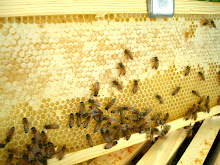Apollo
Apollo is my original hive, which I started with a package back in May 2010. This hive has overcome numerous problems including multiple swarms, one particularly brutal and prolonged cold snap and several different pests.
A couple of months ago, I pulled off the cover and noticed that there was a white substance underneath the inner cover. It looked like expandable foam sealant, actually. I had a very hard time prying the inner cover off the top super, and when I finally did, was horrified to see a thick layer of white cocoons. Apollo had a wax moth infestation. (Click on the photo below if you'd like to see an enlarged image.)

Wax moths are extremely destructive insects, spinning webs throughout the hive and their larvae destroying not only the brood comb but also the hive equipment. Here is a picture of the damage done to the super and frames by larvae burrowing into the wood.

I removed the top super — which could not be salvaged — and cleaned out as much webbing and other wax moth debris as I could, put in some fondant for the bees to feed on, closed the cover and hoped for the best. Although I've been told that honeybees are likely to abscond from a wax moth-infested hive, the Apollo bees chose to stay and, miraculously, appear to be thriving right now.
Recently I attended a lecture given by honeybee expert Dr. Keith Delaplane about colony collapse disorder and what the disappearance of honeybees and other pollinators means to the environment and to our way of life. (Check out this informative editorial, "On Einstein, Bees, and Survival of the Human Race.")
Afterward, I was able to ask Dr. D. about my wax moth issue and he just smiled and said, "Wax moths are generally only a symptom of a bigger problem. If the hive is healthy and the bees are robust, they can fend off wax moths pretty easily." So, we talked about the probability of Varroa mites (at least the small hive beetles are under control, I'm glad to say), or... an unhealthy or dead queen. He suggested I "re-queen" the hive, which involves killing the old queen and introducing a new, healthy queen. I shuddered visibly, I guess, because Dr. D. simply smiled again and wished me luck.
For now, I'm watching and waiting to see if Apollo has the strength to keep on keepin' on. There are hundreds of girls out and about lately, flying around in the sunshine on these warm afternoons, so I'm thinking they're gonna make it.
Rocky
Sadly, today I discovered that the Rocky hive is dead. I'd suspected as much because there have been so few bees visibly out and about, nowhere near as many as Apollo. I'm sad and feeling like a "bad mom" because if I'd paid more attention sooner, I might have been able to salvage the situation. I could've re-queened this hive and fed the bees with not only fondant, but also pollen patties.
Bees need a food source during the winter, even in Atlanta where there is some pollen available for foraging pretty much year-round. This year, I didn't give them pollen patties and I feel like this was part of the reason for hive failure.
So, I fell down on the job and it's a hard lesson learned again after losing the Sweet Beezus hive last winter.
Plan B
I've got a package of bees on order to repopulate Sweet B, and those bees will arrive in May. In the meantime, I've signed up to attend a hive inspection tour offered by the Metro Atlanta Beekeepers Association in a few weeks. The inspection of multiple hives will be conducted by a master beekeeper and we'll be able to observe and learn what to look for in determining whether the hive is healthy or has problems.
Also, I found out that, as a MABA member, I can put my name on the "swarm list" and possibly be the recipient of a swarm of bees that MABA beekeepers are routinely called on to collect from people's yards, businesses, school playgrounds, etc. As often as my own Apollo bees have swarmed in the past, I might be lucky enough to collect my own swarm again this spring and repopulate the Rocky hive. And that's an interesting idea in itself, because Rocky was started from an Apollo swarm the first year I began beekeeping.

No comments:
Post a Comment